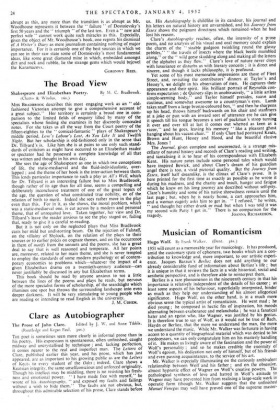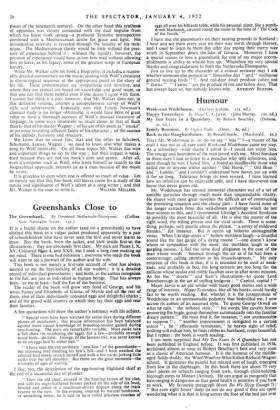Musician of Romanticism
Hugo Wolf. By Frank Walker. (Dent. 36s.) 1951 will count as a memorable year for musicology. It has produced, amid the customary spate of ephemera, two books which are a con- tribution to knowledge and, more important, to our artistic experi- ence. Jacques Barzun's Berlioz does not add anything to our already considerable fund of information about Berlioz's life ; but it is unique in that it reviews the facts in a wide historical, social and aesthetic perspective, and is therefore able to reinterpret them.
Berlioz is a rare phenomenon in the nineteenth century in that his importance is relatively independent of the details of his career ; at least some aspects of his behaviour, superficially interpreted, hinder as much as they help our understanding of his almost allegorical significance. Hugo Wolf, on the other hand, is in a much more obvious sense the typical artist of romanticism. He went mad ; he died young he composed in hectic fits of inspiration, his moods alternating between exuberance and melancholia ; he was a fanatical hater and an egoist who, like Wagner, was justified by his genius. It is therefore true to say of Wolf, as it would not be true of Bach, Haydn or Berlioz, that the more we understand the man, the more we understand the music. While Mr. Walker was fortunate in having access to a quantity of biographical material which was denied to his predecessors, we can only congratulate him on his masterly handling of it. He makes us livingly aware of the fascination and the power of Wolf's personality ; and so he makes credible the enormity of Wolf's egoism, his dedication not only of himself, but of his friends and even passing acquaintances, to the service of his art. Mr. Walker is especially illuminating on the curiously ambivalent relationship between Wolf and his father • and on., the obsessive, almost hypnotic effect of Wagner on Wolf's creative powers. The pathological synthesis of love and hatred in Wolf's attitude to Wagner may have prevented him from realising a large-scale work in operatic form (though Mr. Walker suggests that the unfinished Manuel Venegas may well have proved one of the supreme master-
pieces of the nineteenth century). On the other hand this synthesis of opposites was closely connected with the dual impulse from which his finest work sprang—a profound Teutonic introspection combined with a Mediterranean desire for grace and light. His introspective intensity is revealed through the lucidity of his tech- nique. The Mediterranean clarity would be little without the pres- sure of experience behind it ; without the lucidity, however, the pressure of experience would have driven him mad without allowing him to leave, as his legacy, some of the greatest songs in European history. •
While Mr. Walker calls his book a biography, it includes.a reason- ably detailed commentary on the music, dealing with Wolf's creations in chronological sequence at the appropriate point in' the story of his life. These commentaries are sympathetic and sensitive, and where they are critical are based on knowledge and good sense, so that one can find them helpful even if one doesn't agree with them. I cannot but think it a pity, however, that Mr. Walker does not, in this definitive volume, attempt a comprehensive survey of Wolf's style and achievement. Especially now that Ernest Newman's classical study is no longer obtainable, it would have been of great value to have a thorough account of Wolf's musical treatment of language, in some ways intuitively so much closer to that of Bach than to that of his master Wagner ; of his use of his poets as " masks" or personae revealing different facets of his character ; of the essence of his melody, harmony and structure.
We know that he owed this, that and the other to Schubert, Schumann, Loewe, Wagner ; we need to know also what makes a song by Wolf inimitable. On all these topics Mr. Walker has wise and important things to say by the way ; but their impact is weak- ened because. they are not the book's core and centre. After all, even a composer such as Wolf, who lends himself so readily 'to the biographical approach, interests us as a man because of the music he wrote.
It is graceless to carp when one is offered so much of value. Let us merely say that this fine book still leaves room for a study of the nature and significance of Wolf's idiom as a song writer ; and that
Mr. Walker is the man to write it. WILFIUD MELLERS.







































 Previous page
Previous page